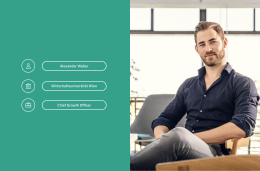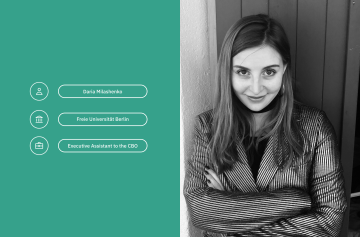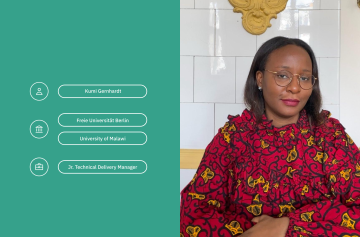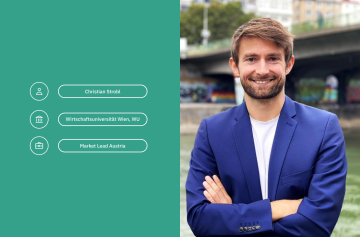
CGO Alexander Weber on the practice and profession of entrepreneurship
Now our CGO, Alexander Weber has been with N26 for nearly 8 years. Learn how he decided to study business and why he thinks being an entrepreneur is about vision, passion, and intrinsic motivation.
8 min read
By the time N26 Chief Growth Officer Alexander Weber was ready to go to college, he already knew that he wanted to study business. His experience at the Vienna University of Economics and Business, as well as his semester abroad at the University of New South Wales in Sydney would inspire not only a near decade-long career at N26, but a deep commitment to entrepreneurship as a practice and profession: “I see entrepreneurship as a way to work on meaningful challenges society has, new ways of thinking about solutions with technology, and a way for people who really want to change something to do so.” We sat down with Alex to discuss his takeaways from his time as a university student and why he thinks it’s so important to surround yourself with other curious, motivated people. Our interview has been edited for length and clarity. Could you start out by telling us a bit about yourself? Sure—my name is Alex, and I was born and raised in Vienna, Austria. However, my mom is from New Zealand, so I had lots of connections there and in Australia, and tried to spend as much time there as possible. In fact, I spent six months in New Zealand during high school, and during university, I spent a semester in Sydney. The reason I mention this is that Sydney is where I really learned what a startup was—and, frankly, discovered my passion for entrepreneurship. In Austria, at that time, a more traditional business path was being advocated for. So, Sydney is where I realized that there was a different path out there that resonated with me. When did you know that you wanted to study business?There are really two kinds of people who study business: those who really don’t know what they want to do, and so they end up in business school for lack of a better idea. And then, there are people who have already found their calling before arriving at uni. I was very fortunate, because when I was 15 and doing my exchange in New Zealand, there was a fantastic economics teacher there who really inspired me to go to business school. He was a real business man and told us many stories about his life—his enthusiasm for the subject really came through. So, by the time I was ready for university, I’d already decided to study business.You were also a competitive swimmer. Can you talk about some parallels you see between sports and entrepreneurship?I can imagine it taught you a lot—there’s so much drive and self-discipline involved in competitive sports.Absolutely. It’s work, it’s discipline, but for me, it’s even more than that. Some see those who play competitive sports as mainly wanting to be better than others. But for me, it’s primarily about competing with yourself, setting your new best time, etc. This idea of getting better every day has remained something I’m very committed to, including thinking about how to become a better leader every day, how to become better in my work, and so on. This focus on self reflection, self-improvement, and work ethic—that’s all stuff I learned through swimming. Can you dive a bit deeper into your university career? You went to the Vienna University of Economics and Business (WU). What were some of the highlights that come to mind?WU is one of the largest universities in Austria, and one of the most renowned business schools in Europe, meaning it attracts many people. So, rather than a small community of business students, it’s thousands of people looking to get established and make connections. However, I was fortunate to be part of an honors program called Top League. It brought together students with high standards and who wanted to meet like-minded people interested in business. They had extracurricular events, where you got to meet people from different industries and have them explain what it’s like to work in their field. It’s something I’m very grateful for, in part because some of my best friends today are people I met there. In fact, I would also never have come to N26 if it weren’t for Top League, because the person that referred the opportunity to me was someone I knew through the program. Also, as my program courses got more specialized, there was one class that I did on international business that I found very interesting. I learned what it meant to run an international company—which is a lot of what I’ve been doing here at N26. You touched a bit on your experience studying abroad in Sydney. Can you talk a bit more about that and how it shaped your worldview of business and entrepreneurship?Absolutely. I would recommend that any student spends some time abroad. We live in such an international world, so having an overseas experience is very important. The people I met in Sydney who were into entrepreneurship were intrinsically motivated, and really believed in what they were doing. That’s when I decided that I wanted to found my own business one day. While I considered starting something right away, I saw a lot of value in joining something at a very early stage as a step in my long-term entrepreneurial vision. That’s when I was introduced to the founders here at N26 and joined their small team back in 2014. Right, you were one of the first employees at N26. What drew you to the company?It was during my last semester—I was working on a startup idea myself with three of my classmates when I heard about this opportunity at N26. At the time, I had just come back from Australia and was feeling frustrated—everyone in Sydney was so motivated and trying to change the world, and I didn’t find many like-minded people when I returned to Vienna. But the way that Max and Valentin, the founders, were thinking about N26, it was this crazy kind of bold vision: a small startup of just five people who said that they were going to change the banking industry. The magnitude of the vision resonated with me, because that was the spirit I’d encountered in Sydney. It was an easy decision to jump on board. Can you tell me a little bit about your role? Sure. I’ve been Chief Growth Officer for the last three years. My role comprises the internationalization element, so not only opening new markets, but also working with the local market teams of our existing markets and driving our business forward locally. But I’m also responsible for our global marketing efforts. In marketing, the idea of general, multidisciplinary skills is important to me—finding that balance of curiosity for the brand side, but also that data-driven approach. Though I come more from the analytical side, I always strive to combine these two perspectives.What are some skills that you use in your work that you feel like you took from university?This is a super interesting question. The key thing about my time at university that I appreciated so much is being surrounded by super curious people, you have the continuous input of diverse perspectives and backgrounds, which gives you a different outlook. You learn open-mindedness, you learn all the things you need to develop yourself. So from a soft-skill perspective, I learned a lot by working in a diverse environment with international people. This even includes things like how I organize my schedule. When I was pursuing my degree while also pursuing other projects on the side, I really learned how to prioritize.What are some pieces of advice you would give to students studying business today? For people who are attending business school, there is this misconception that you just start a company from your dorm room and then you become this big entrepreneur—and that this is how entrepreneurship works. But I really see entrepreneurship as a long-term profession. People who become a doctor don’t expect that they’ll do their first major surgery after two years—they expect it will take at least a decade before they get to the peak of their skills. And yet young entrepreneurs have this idea that they’ll start a company and six months later they’ll be the head of this big, successful business. And if they don’t succeed right out of school, they often give up and go work for a big corporation. So, what I would say is that you don’t have to start your entrepreneurial career as a founder. As I see it, the job of the founder is one of the hardest things you can pursue. You’ll need to learn, grow, and adapt—it’s a journey that requires a ton of skills. So, I believe you don’t have to be a founder right away to be an entrepreneur in the long-term. I see this now, after almost 8 years working within a startup. I’m not the founder of N26, but I would argue that if I were to start a company today, it would have a much greater chance to be successful than if I’d done so right out of college.
Find similar stories
BY N26Love your bank
Related Post
These might also interest youINSIDEN26Team spotlight: Daria Milashenko, Executive Assistant to the CBOWhen Daria Milashenko, Executive Assistant to the CBO at N26, visited Berlin at 15, it was love at first sight.
9 min read
INSIDEN26Jr. Technical Delivery Manager Kumi GernhardtKumi’s career has taken many twists and turns—from a career in journalism to a Technical Delivery Manager at N26. Read on to learn how her passion for communication helped her forge her path.
8 min read
INSIDEN26 Austrian Team Lead Christian Strobl on how uni prepared him for his role at N26Team spotlight: After founding his own startup right out of uni, Christian Strobl was ready for a new challenge. Learn how he landed his role at N26, and how his university career impacted his career.
6 min read


